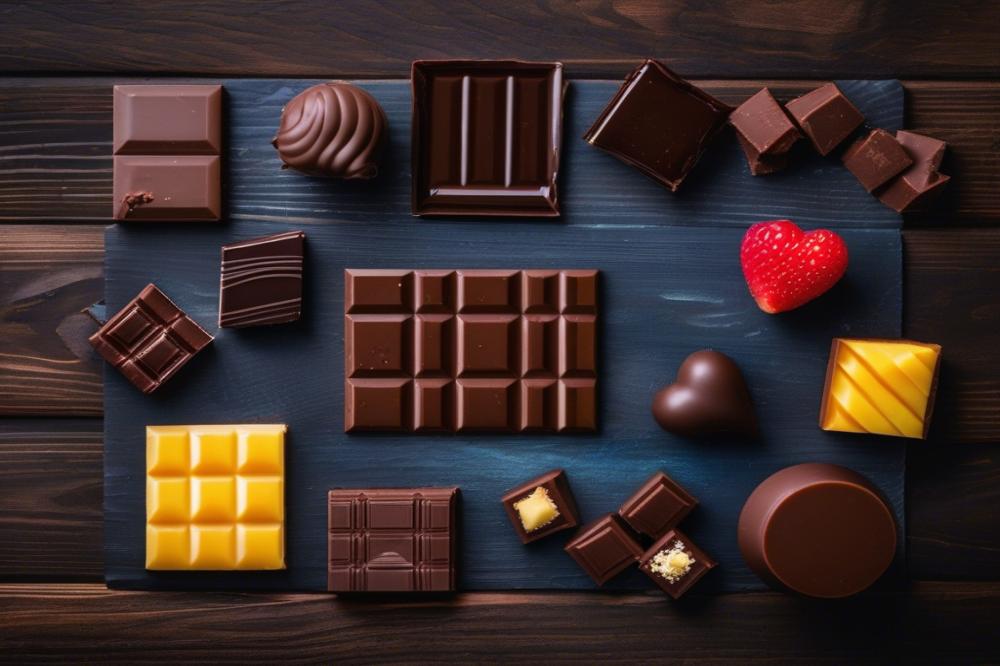Introduction
chocolate has captured hearts and taste buds across cultures and generations. As a beloved treat, it holds a place of affection in many societies. People enjoy it in various forms, from bars to decadent desserts. Cultural significance surrounds it, making it a staple at celebrations. Birthdays, holidays, and weddings often feature this sweet delicacy. Beyond mere enjoyment, chocolate carries a deeper meaning, often tied to emotions and shared experiences. It brings friends and family together, enhancing moments of joy and connection.
This delicious treat plays a pivotal role in social bonding. When shared or gifted, it expresses feelings and strengthens relationships. Many people gift chocolate to show love and appreciation. It becomes a vehicle for emotional exchange, bridging gaps and deepening connections. Discussions around its psychological effects reveal fascinating insights into how it influences our feelings. Neuroscience shows that indulging in chocolate can release endorphins, which are chemicals that create a sense of happiness.
Exploring the benefits of this beloved treat can shed light on its impact on our lives. Its health benefits, when enjoyed in moderation, may contribute to overall well-being. However, the real treasure lies in its power to foster connections among individuals. As we delve into this topic, we will uncover how chocolate enhances relationships and nurtures social bonds.
The Neuroscience of Chocolate

Chocolate contains several compounds that influence emotions in interesting ways. It is rich in substances like flavonoids, theobromine, and phenylethylamine. These ingredients can boost mood and enhance feelings of happiness. Their effects make chocolate a popular treat during celebrations and as gifts.
When someone enjoys this sweet delicacy, their brain responds positively. Indulging in chocolate stimulates the release of neurotransmitters. Serotonin, often called the “feel-good hormone,” plays a significant role in regulating mood. Endorphins also get released, creating a sense of pleasure and often leading to feelings of love and happiness.
The release of these chemicals can change social interactions. People tend to feel more relaxed and friendly after indulging in sweet treats. This can lead to deeper conversations and shared experiences. Relationships often grow stronger during such moments of joy. In different cultures, chocolate holds a significant place during celebrations and social gatherings.
Health benefits are also linked to chocolate consumption. Some studies indicate that it can lower stress levels and improve overall well-being. This makes it more than just a tasty treat; it offers psychological effects that can foster connections among individuals. By creating pleasant memories, it reinforces bonds and promotes happiness in relationships.
Chocolate as a Catalyst for Shared Experiences

In social settings, sweets play a special role. Parties and gatherings often feature treats that bring people together. Celebrations, such as birthdays and weddings, frequently include delicious desserts. These shared experiences create moments filled with joy and laughter.
It’s amazing how sharing treats can strengthen relationships. When friends exchange sweets, it can enhance feelings of connection. Sharing a delicious treat often sparks conversations and laughter. Emotions are stirred when a simple bite can remind individuals of fond memories. For many, this act of giving can symbolize love and care, reinforcing bonds.
Cultural Traditions Involving Treats
Many cultures celebrate with sweet delights. In Mexico, people enjoy hot chocolate during Día de los Muertos, a day to remember loved ones. This warm drink becomes a part of remembering relationships and celebrating life. Similarly, in Belgium, giving chocolate as gifts is a sign of friendship and warmth. These traditions highlight the cultural significance of treats in daily life.
Across the globe, sweet rituals show how this food connects people. In Italy, couples often share a piece of chocolate as a romantic gesture. Neuroscience suggests that engaging in these enjoyable moments releases feel-good hormones, promoting happiness. Psychological effects can be profound, showing how simple actions can deeply impact emotions.
Health benefits also play a role in these shared experiences. Dark chocolate, for instance, is known to have antioxidants. Discussing these positive effects can lead to conversations about well-being. Sharing a piece can feel like sharing good intentions, creating an inviting atmosphere.
From gatherings to intimate moments, the influence of these delights remains undeniable. Authentic connections often bloom over shared enjoyment. Investing time in these experiences can deepen relationships and create lasting memories that individuals treasure for years to come.
Chocolate and Relationships: A Symbol of Love

Throughout history, people have used chocolate as a gift to express affection. Different cultures have woven this delightful treat into their traditions. In many societies, chocolate is more than just food; it symbolizes love and connection. Its rich flavor often evokes feelings of warmth and intimacy, making it a favored choice for many celebrations.
Romantic relationships particularly thrive on shared experiences. Couples frequently exchange gifts as tokens of their feelings. Chocolate fits into these moments perfectly, enhancing emotions and making occasions like anniversaries and Valentine’s Day even more special. When someone gifts this delicious treat, it often speaks louder than words. The act of giving becomes an expression of love and thoughtfulness.
Scientific studies reveal some fascinating aspects of emotional bonding. Neuroscience shows that certain chemicals in the brain respond positively to chocolate consumption. When shared, these experiences can strengthen relationships. Partners who share a love for this sweet delight often find joy in the act of giving and receiving. Moreover, the shared excitement around chocolate can foster deeper intimacy.
Every bite can bring joy and enhance feelings of happiness. The health benefits associated with dark varieties can add another layer to the gift. It’s not just a treat; it promotes well-being, too. This thoughtful choice makes it a practical gift that combines pleasure with care. Consequently, when someone is given chocolate, it can lighten their day and show that they are cherished.
In cultural celebrations around the world, this sweet gift carries unique significance. Whether it’s given during holidays or special personal events, it plays a vital role. The association with love resonates universally. Generations have turned to this delightful confection to express their feelings. This simple act creates lasting memories between individuals.
Ultimately, the psychological effects of gift-giving are profound. A thoughtful gift can strengthen bonds and enhance emotional ties. The act of sharing enhances connections. In romantic settings, exchanging chocolate can create a moment of joy, creating memories that are cherished. These moments become part of the tapestry of love woven over time.
Health benefits of chocolate and Their Social Implications
Moderate consumption of chocolate offers various health benefits. Studies suggest it can improve heart health, boost brain function, and enhance mood. These positive effects stem from the presence of antioxidants and other beneficial compounds. Emotions play a role in how people connect. Healthier individuals often enjoy more vibrant relationships.
Social activities are often influenced by health trends. When communities embrace the idea that chocolate can be good for well-being, social events may evolve. Celebrations, like birthdays or anniversaries, might feature chocolate-themed treats. In these moments, relationships grow stronger as people bond over shared experiences. A gift of chocolate can express affection and care, strengthening connections.
The psychological effects are worth noting. Eating chocolate can trigger the release of feel-good chemicals in the brain. This creates a sense of joy and pleasure, which can enhance social interactions. When people gather to enjoy a treat, the atmosphere often becomes lively. Those experiences contribute to forming lasting memories among friends and loved ones.
Cultural significance cannot be overlooked. In many cultures, chocolate is associated with giving and special occasions. This backdrop enriches social dynamics. It connects people through traditions surrounding love and celebration. Whether it’s a simple gesture or a grand celebration, the act of sharing adds meaning to relationships.
Neuroscience highlights how our brains react positively to certain foods. When consumed in moderation, chocolate may help lower stress and promote relaxation. This encourages open conversations and deeper connections. Friends who enjoy these moments together may find their relationships flourished by such simple pleasures.
In summary, the interplay between health benefits and social engagement reveals much about human connection. Shared experiences surrounding chocolate can invite laughter, joy, and the warmth of friendships. Many find that these interactions are enriched by understanding the positive effects on both mind and body. As a central figure in celebrations, it fosters a sense of belonging and love among people.
Cultural Significance of Chocolate in social bonding
Numerous cultures around the globe incorporate chocolate into their social traditions. In some regions, it serves as a centerpiece in celebrations. For example, in Mexico, the Day of the Dead features cacao drinks that honor loved ones. Families come together, sharing memories, enhancing connections through rituals steeped in history.
Different perspectives can shape how societies view chocolate. In Western cultures, giving chocolate often expresses love and affection. In contrast, some Asian cultures see it as an expensive gift reserved for special occasions. This variation influences relationships and the emotions attached to gifts, fostering unique social dynamics.
Emotional Connections and Shared Experiences
Chocolate plays a vital role in fostering emotional bonds. It enhances celebrations, whether during birthdays or festivals. People gather to enjoy sweets, creating lasting memories. Shared experiences, like making chocolate treats, strengthen friendships and familial ties. Neuroscience indicates that consuming chocolate might release endorphins, leading to feelings of happiness.
Case Studies of Festivals and Events
Festivals around the world celebrate this fascinating product. The Salon du Chocolat in Paris showcases artisans and their creations. Visitors revel in tastings and demonstrations, learning about the art involved. Another example is the Chocolate Festival in London, where participants taste, savor, and engage in workshops. Such gatherings highlight not only the culinary delights but also the significance of community.
Health benefits also emerge in discussions about chocolate. Many cultures celebrate its richness with both enthusiasm and caution. Acknowledging its psychological effects, some enjoy it as a comfort food. In Argentina, during evening gatherings, chocolate becomes a social lubricant, easing conversations and fostering connections.
Unique customs and traditions can enrich the understanding of these social dynamics. Whether served at weddings in Switzerland or presented as gifts during the Lunar New Year in China, chocolate often signifies goodwill. Events centered around this treat point to its role in connection and bonding. These celebrations become catalysts for relationships and serve as reminders of our shared humanity.
Final Thoughts on the Power of Chocolate in Building Bonds
Throughout history, this delightful treat has shown a remarkable ability to bring people together. Its role in social gatherings and celebrations highlights how it can strengthen connections. People often share it during important moments, creating lasting memories. Whether it’s a simple gift or a shared dessert, these experiences cultivate warmth and affection.
Emotions play a significant part in our relationships. When shared, chocolate can trigger feelings of joy and comfort. It acts as a bridge, connecting friends, family, and partners. Through shared experiences, individuals can foster a deeper understanding of one another, enhancing their bonds over time.
Consider exploring it as a way to enrich your own connections. Small gestures can lead to big impacts, especially in today’s busy world. Inviting someone to enjoy this sweet treat together can open the door to meaningful conversations. Building memories over a shared dessert can create a beautiful foundation for friendships and love.
In essence, this beloved food serves more than just a satisfying taste. It encourages togetherness, laughter, and shared moments. By embracing it in social interactions, everyone can enhance the quality of their relationships. So, take a moment to enjoy this simple pleasure and watch how it brings joy to those around you.



